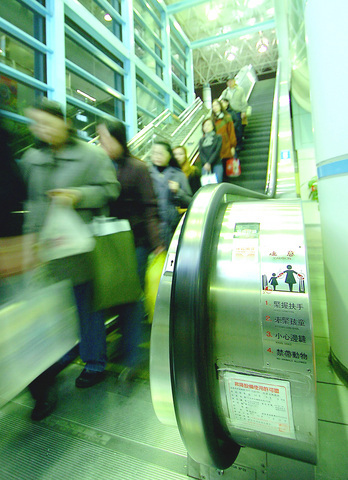The head of Taipei's subway system yesterday offered his apologies for his mishandling of a New Year's Eve accident that injured five people, according to the Central News Agency.
"Since 2000, we've seen 200 escalator-related accidents. We will rethink the current policy of allowing passengers in a hurry to walk on the left hand side of the escalator," Taipei Rapid Transit Corporation President Tsay Huei-sheng (

PHOTO: FANG PIN-CHAO, TAIPEI TIMES
Five passengers were hurt on the escalators leading to platforms amid the crowds that packed onto trains headed to celebrations held around Taipei City Hall on New Year's Eve. Two people were seriously injured and the other three sustained minor abrasions. One female passenger's hair was caught in the escalator, causing her hair to be torn out and her scalp to be ripped in the process.
According to the corporation's safety regulations, escalators must be turned off if subway platforms become too crowded to prevent accidents. A surveillance tape from the evening of the accident indicates that transit employees failed to shut down the escalators as required.
Tsay said he would accept whatever decision a city investigation handed down, and that he planned to convene a meeting with the injured parties and the to discuss appropriate compensation. He also said that the erroneous reports the transit employees had given on the accident would be investigated. Despite testimonies given by the injured passengers indicating otherwise, transit employees had said that the platform was not crowded and that the injuries sustained had been minor. The woman whose scalp was torn by the escalator received over 100 stitches, but employees reported it to be about 10.

SHIPS, TRAINS AND AUTOMOBILES: The ministry has announced changes to varied transportation industries taking effect soon, with a number of effects for passengers Beginning next month, the post office is canceling signature upon delivery and written inquiry services for international registered small packets in accordance with the new policy of the Universal Postal Union, the Ministry of Transportation and Communications said yesterday. The new policy does not apply to packets that are to be delivered to China, the ministry said. Senders of international registered small packets would receive a NT$10 rebate on postage if the packets are sent from Jan. 1 to March 31, it added. The ministry said that three other policies are also scheduled to take effect next month. International cruise ship operators

NUMBERS IMBALANCE: More than 4 million Taiwanese have visited China this year, while only about half a million Chinese have visited here Beijing has yet to respond to Taiwan’s requests for negotiation over matters related to the recovery of cross-strait tourism, the Tourism Administration said yesterday. Taiwan’s tourism authority issued the statement after Chinese-language daily the China Times reported yesterday that the government’s policy of banning group tours to China does not stop Taiwanese from visiting the country. As of October, more than 4.2 million had traveled to China this year, exceeding last year. Beijing estimated the number of Taiwanese tourists in China could reach 4.5 million this year. By contrast, only 500,000 Chinese tourists are expected in Taiwan, the report said. The report

The Forestry and Nature Conservation Agency yesterday launched a gift box to market honey “certified by a Formosan black bear” in appreciation of a beekeeper’s amicable interaction with a honey-thieving bear. Beekeeper Chih Ming-chen (池明鎮) in January inspected his bee farm in Hualien County’s Jhuosi Township (卓溪) and found that more than 20 beehives had been destroyed and many hives were eaten, with bear droppings and paw prints near the destroyed hives, the agency said. Chih returned to the farm to move the remaining beehives away that evening when he encountered a Formosan black bear only 20m away, the agency said. The bear

HORROR STORIES: One victim recounted not realizing they had been stabbed and seeing people bleeding, while another recalled breaking down in tears after fleeing A man on Friday died after he tried to fight the knife-wielding suspect who went on a stabbing spree near two of Taipei’s busiest metro stations, Taipei Mayor Chiang Wan-an (蔣萬安) said. The 57-year-old man, identified by his family name, Yu (余), encountered the suspect at Exit M7 of Taipei Main Station and immediately tried to stop him, but was fatally wounded and later died, Chiang said, calling the incident “heartbreaking.” Yu’s family would receive at least NT$5 million (US$158,584) in compensation through the Taipei Rapid Transit Corp’s (TRTC) insurance coverage, he said after convening an emergency security response meeting yesterday morning. National